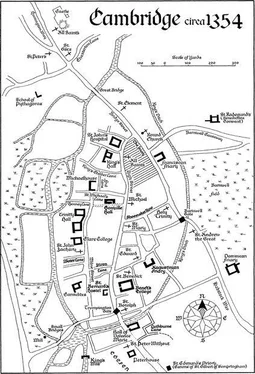‘The Chancellor was concerned about the subject matter of Kyrkeby’s lecture,’ said Michael cautiously. ‘Have you heard anything about this?’
‘No,’ replied Morden. ‘But I can see why. Realists are narrow-minded bigots, who would have been unwilling to listen to what Kyrkeby had to say.’
‘Very likely,’ said Michael. ‘And so Chancellor Tynkell decided to change the title of the lecture to that of life on other planets. You know nothing about this, you say?’
‘That must be the letter waiting for Kyrkeby in the chapter house,’ said Ringstead, looking at his Prior. ‘It arrived yesterday, and we wondered what it was about.’
‘None of you opened it?’ asked Michael.
‘Of course not,’ said Morden, offended. ‘That would have been most improper.’
‘It is a pity no one will ever hear Kyrkeby talking about nominalism,’ said Ringstead loyally. He paled suddenly as a thought occurred to him. ‘But what shall we do about that? We Dominicans are supposed to give the University Lecture, and now that Kyrkeby is dead, we shall have to find a replacement!’
‘Lord!’ breathed Morden in alarm. ‘We do not have anyone else who can give such a lecture – on nominalism, life on Venus or anything else! We need more time to prepare.’
‘A replacement has already been appointed,’ said Michael soothingly. ‘Tynkell invited someone else to take Kyrkeby’s place when he failed to acknowledge Tynkell’s letter.’
‘Do you know anything about an essay on nominalism?’ asked Bartholomew, thinking about Faricius. ‘We believe one of the Carmelites may have been writing one, but it has disappeared.’
‘A Carmelite?’ asked Morden in surprise. ‘But they follow the heretical and outdated principles of realism.’
‘Not all of them,’ said Michael. ‘Just as I imagine that not all Dominicans are nominalists. There are exceptions.’
‘I doubt any Dominican would be foolish enough to believe in realism,’ said Morden superiorly. He glanced covertly at Clippesby, as if expecting him to announce that he did, but the Michaelhouse man was silent, staring at the flames that burned in Morden’s large hearth. ‘But it is possible that the odd Carmelite may have seen the light, I suppose.’
‘I know of no Carmelite essay, though,’ said Ringstead. ‘We use William Heytesbury’s books for our lectures, not essays by unknown authors.’
‘Thank you for your help,’ said Michael, preparing to leave. He exchanged a glance with Bartholomew, who knew he wanted to quiz Morden about his nocturnal meetings at St Radegund’s Convent but was reluctant to broach the subject and risk alerting Morden that he was investigating them. Bartholomew racked his brain for ways to introduce the topic, but Michael gave a small shake of his head, afraid that Morden would simply deny the accusation and promptly warn his associates that the Senior Proctor had wind of their dealings.
‘Do not forget to collect Master Kenyngham on your way out,’ said Morden, scrambling down from his chair to prevent Michael from opening the door. He was too late, and it crashed against the wall, so hard that he winced. ‘And take Clippesby with you, too.’
‘I am leaving now anyway,’ said Clippesby, following Michael. ‘It is kind of you to be concerned for my safety in these times of unrest, Father Prior, but you have no need to worry.’
‘I am glad to hear it,’ said Morden, clearly not at all interested in Clippesby’s well-being.
‘I often walk alone,’ Clippesby went on. ‘You and I are much alike in that respect.’
‘What do you mean?’ asked Morden uneasily. ‘I do not wander the town unaccompanied. I always take a servant with me.’
‘Not always,’ corrected Clippesby, sounding surprised by the assertion. ‘Sometimes you go alone. For example, I have seen you several times on the Barnwell Causeway at night.’
Michael closed his eyes in exasperation. He had decided that to interrogate Morden about the meetings might prove detrimental to the case, and the last thing he wanted was for the insane Clippesby to be conducting the interview.
But Clippesby was oblivious to the foul looks shot his way by both the Prior and Michael, although their disapproval was for very different reasons. ‘You walked to St Radegund’s Convent, where you met your friends,’ he said.
‘And which particular animal told you this?’ asked Ringstead unpleasantly. ‘An owl? Or do creatures who spy on men in the night tend towards slugs and bats and other unclean beasts?’
‘No animal told me,’ said Clippesby, offended. ‘I saw him myself. He met Prior Ralph from Barnwell and old Adam from Ely Hall, and they went into St Radegund’s Convent together.’
‘Really?’ asked Michael mildly, realising that it would look suspicious not to persist with the query now that Clippesby had raised the issue. ‘And what were you doing there, Prior Morden?’
‘If you must know, I had business with Walcote, your Junior Proctor.’
‘And what business would that be?’ pressed Michael.
‘I cannot tell you,’ said Morden, folding his small arms and looking away, signifying that he had said all he was going to on the matter.
Michael had other ideas. ‘You can tell me. Or the Carmelites might discover what passed in the Dominican Friary involving certain face paints.’
‘No!’ exclaimed Morden in horror. He glowered at Clippesby, seeing in the Michaelhouse man the reason for his awkward situation. ‘But this is blackmail!’
‘My Junior Proctor was murdered, Prior Morden,’ said Michael coldly. ‘I will do whatever it takes to catch the person who did it, and if that includes telling the Carmelites that the Dominicans like to paint their faces, then so be it.’
Morden closed his eyes in resignation. ‘Very well. But you will not like what I have to say.’
‘Probably not,’ said Michael. ‘But you will tell me anyway.’
Morden sighed. ‘I met three or four times with your Junior Proctor. Prior Ralph and some of his colleagues were there and once – in December – so was Brother Adam from Ely Hall.’
‘Did Master Kenyngham of Michaelhouse ever go?’ asked Bartholomew.
‘No Gilbertines were invited. And no Franciscans or Carmelites, either. Doubtless Walcote only wanted civilised company.’
‘And what did you talk about?’ asked Michael.
‘We discussed the validity of nominalism, among other things. We all believe it to be the superior philosophical theory.’
‘Yes, yes,’ said Michael impatiently. ‘I know many Benedictines and Austin canons concur with you on that. But why did you go to St Radegund’s in the middle of the night to discuss it? What was wrong with a lecture hall in the day?’
‘We discussed other matters, too,’ said Morden. He licked his lips, and glanced at the others. Ringstead, it seemed, was as curious as the others to learn what his Prior did at a place like St Radegund’s Convent at the witching hour.
‘Like what?’ pressed Michael.
‘Murder,’ said Morden in a low voice. ‘We discussed murder.’
‘Now we are getting somewhere,’ said Michael. ‘Whose murder?’
‘Yours, Brother,’ replied Morden.
‘I confess Morden’s claim unsettled me at first,’ said Michael, taking his place at the high table in Michaelhouse’s hall for dinner that night. ‘But on reflection, I think there is no need to worry.’
Bartholomew regarded him uneasily. ‘And how did you reach that conclusion, Brother?’
‘According to Morden, Walcote learned about the plan to kill me in December, but I am still here. Whoever it is must have given up the idea.’
‘I am not so sure about that,’ said Bartholomew, worried. ‘Walcote is dead, and we cannot be sure that he was not murdered because he was close to exposing this plot.’
Читать дальше












